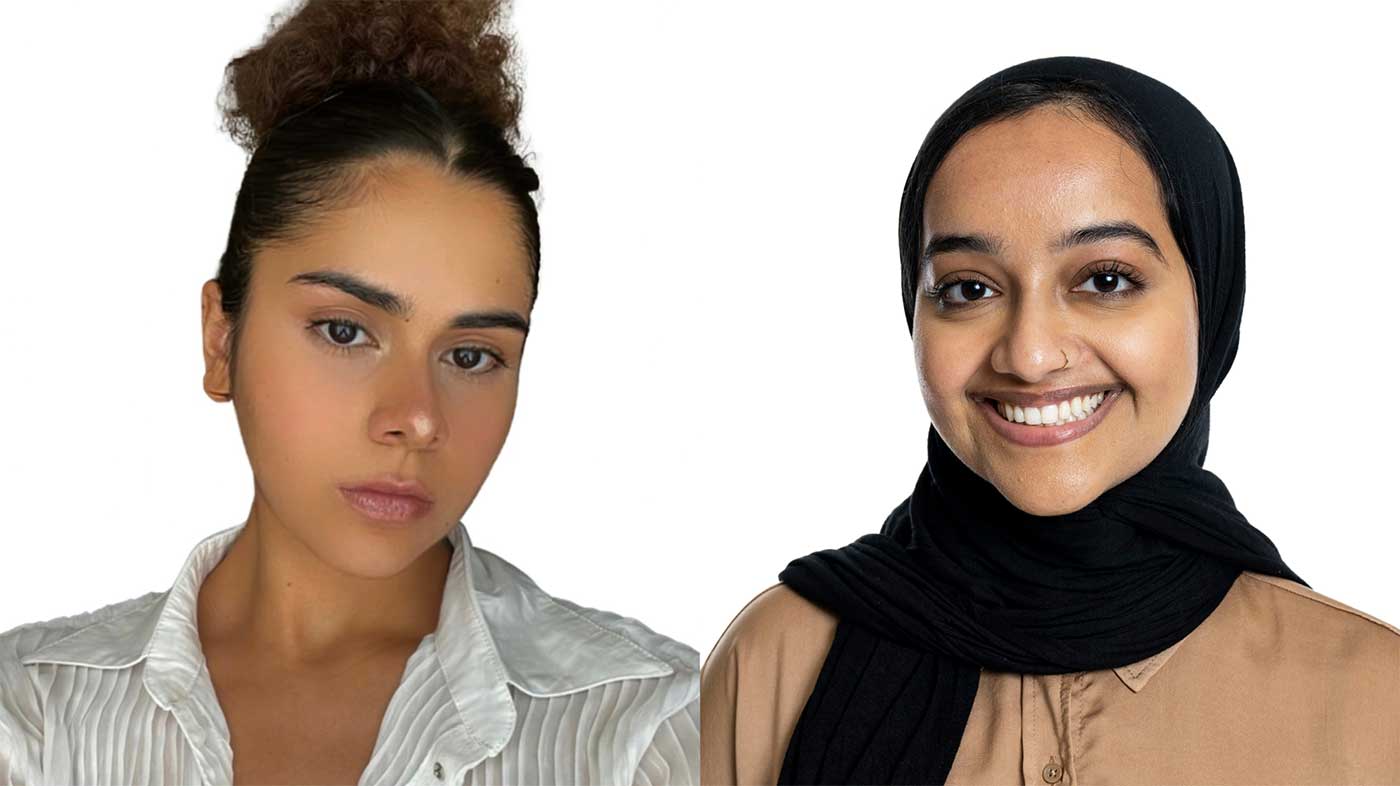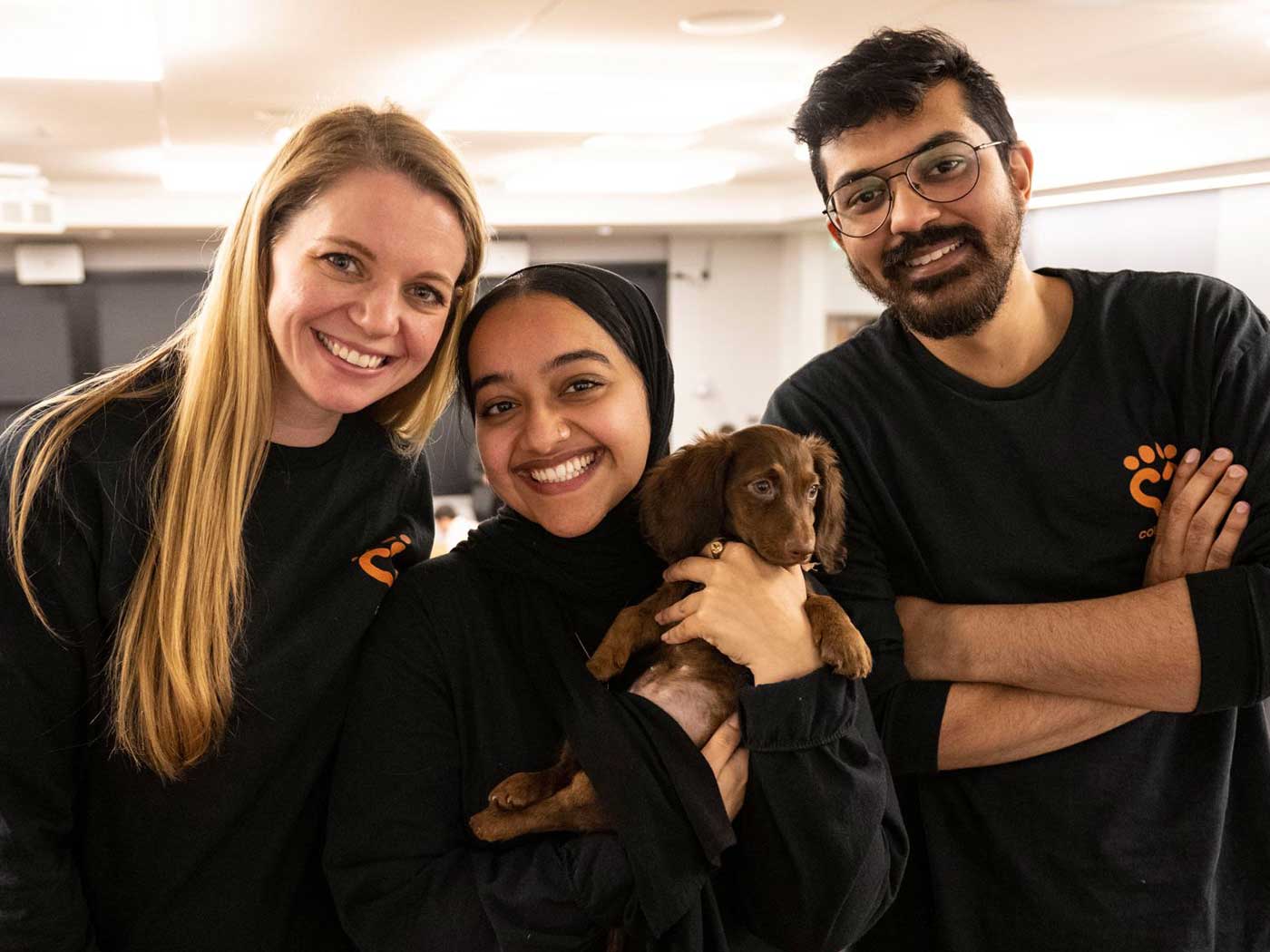Khoury “Women Who Empower” winners advance cybersecurity, pet care tools
Author: Attrayee Chakraborty
Date: 10.17.23
 Alexis Musaelyan-Blackmon (left) and Dania Alnahdi.
Alexis Musaelyan-Blackmon (left) and Dania Alnahdi.
Northeastern University’s Women Who Empower initiative was founded on the belief that diverse and inclusive communities contribute to a more enriched world. The initiative serves as a platform for women to share their stories, foster connections, and engage with distinguished speakers and advocates representing a range of experiences and professional paths.
This year, the third annual Women Who Empower Innovator Awards celebrated the accomplishments of 28 outstanding women from a pool of 110 applicants, with a record total of $500,000 awarded. The recognition is bestowed upon Northeastern students and alumni who advance areas such as health, diversity and inclusion, global change, social impact, and sustainability. Among this year’s honorees were two members of the Khoury community: undergraduate Alexis Musaelyan-Blackmon and alumna Dania Alnahdi.
Alexis Musaelyan-Blackmon
Alexis Musaelyan-Blackmon, on track to earn a bachelor’s in data science and biology in 2025 and a master’s in data science in 2026, secured first place in the “Powering Diverse and Inclusive Communities of Belonging” category. With a passion for harnessing data, AI, and computational biology, Musaelyan-Blackmon came up with the idea of Dephend — a play on “phishing” and “defend” — to tackle ever-changing security threats.
Dephend is a cloud-based software-as-a-service security platform which, once deployed, will provide real-time insights into cyber threats. Using machine learning algorithms, the platform will continuously scan incoming URLs and content to detect phishing threats, then present its findings on an intuitive, user-friendly dashboard. Users can monitor system performance, view detailed reports, customize security settings, and set up easy-to-use response actions to ensure efficient threat mitigation.

“My driving force is to create social impact in my endeavors,” Musaelyan-Blackmon says. “With Dephend, I aim to bridge the gender gap in technology and cybersecurity.”
Musaelyan-Blackmon conceived of Dephend at a cybersecurity pitch competition while attending Khoury College’s Virtual Institutes for Cyber and Electromagnetic Spectrum Research and Employ (VICEROY) program, which aims to bolster the cybersecurity industry’s talent pipeline. Determined to bring awareness and recognitions to the project, she was inspired to apply for the Women Who Empower Innovator Award.
READ: From scholarships to cross-university classes, VICEROY preps Khoury students for cyber defense
Musaelyan-Blackmon hopes to grow Dephend through her unique perspective, which she forged in part through her national cybersecurity work at the Naval Research Lab, along with her fellowship at the Department of Homeland Security. So far, Musaelyan-Blackmon has secured Northeastern advisors for Dephend, including VICEROY lead Jose Sierra and the National Security Innovation Network’s John Griffin. And her work is just beginning.
“I plan to advance artificial intelligence technologies to see if I could leverage that for Dephend,” Musaelyan-Blackmon says. “I see Dephend building more strategic partnerships and collaborations with other government agencies as well.”
Musaelyan-Blackmon’s path hasn’t been without challenges, and in that vein, she envisions herself starting a cybersecurity mentorship program to cater to high-school and college-bound women.
“Seeing a group of women working in cybersecurity breaking the glass ceiling can serve as a role model to youngsters doubting their potential,” Musaelyan-Blackmon says. “That’s my ultimate goal with Dephend as well … Being a young woman with an idea, securing funding was tough. But I saw Dephend as an opportunity to grow and find people like me, and I learned the beauty of resilience.”
Dania Alnahdi
Dania Alnahdi, a 2022 Khoury College graduate, secured second place in the “Young Undergraduate Alumnae Award Winners” category. Despite initial doubts about launching her own business, Alnahdi took a bold step forward in January 2023, driven by her personal encounter with a sick pet.
“We suddenly found blood in our pet cat’s urine, so we took her to several vets,” Alnahdi recalls. “It was only after much time had passed and numerous misdiagnoses that she was finally diagnosed with kidney disease, leading to the loss of an entire kidney. That’s when I realized that there aren’t many ways to test pets at home and catch diseases early before late-stage symptoms appear.”
She wasn’t the only one thinking this way. While attending pet conferences and talking to pet owners, Alnahdi found pet diagnosis to be a recurring problem. Her solution, Cora Care Strips, offers pet owners assurance through immediate, cost-effective insights into their pet’s well-being.
To detect changes in a dog’s health, Cora Care uses Smart Strips — a patented technology which leverages monoclonal antibodies to detect specific biomarkers in saliva. Using a suite of biomarkers and data analytics tools, Cora Care’s technology can identify conditions like liver disease, kidney disease, parvovirus, diabetes, and inflammatory bowel disease in dogs. The team is also planning to expand the product to cats.
“My team is very motivated by this problem,” Alnahdi says. “We combined our diverse skillsets and entrepreneurial mindset to set up this company.”

For Alnahdi, that skillset came in the form of computer science and design skills honed at Khoury College, along with experience from three co-ops. Meanwhile, her co-founders brought in sales, finance, and data analytics perspectives. Now master’s students in engineering management and innovation at nearby Tufts University, the team consulted Tufts’ veterinary school and researchers who were already using blood, saliva, and urine tests in their research.
After making it to the final round of three biotech accelerator programs and leveraging their collective experience to develop and prototype their own ideas, the team feels that they are on the path to gain funding.
“My biggest learning as an entrepreneur is becoming comfortable with not knowing what exactly needs to be done,” Alnahdi says. “And of course, never feeling dejected when I’m close — but not quite close enough — to win.”
As a Middle Eastern, Muslim, female entrepreneur venturing into a male-dominated sector, and as a longstanding advocate for diversity within the technology realm, Alnahdi aspires to inspire other women to follow their entrepreneurial aspirations and feel at ease within technology and engineering spheres. This has spilled into Cora Care’s values as well, as the company aims to make technology accessible to all.
“Pet care is expensive,” Alnahdi says, “And we understand the diversity in age, languages, and cost-privilege that comes with it.
“If you’d tell me a year back that I’d have my own venture, I wouldn’t have believed it,” Alnahdi adds. “But I realize that as someone coming out of tech, I can have a greater impact in society by creating solutions which can be used by everyone.”
Subscribe to Khoury News
The Khoury Network: Be in the know
Subscribe now to our monthly newsletter for the latest stories and achievements of our students and faculty